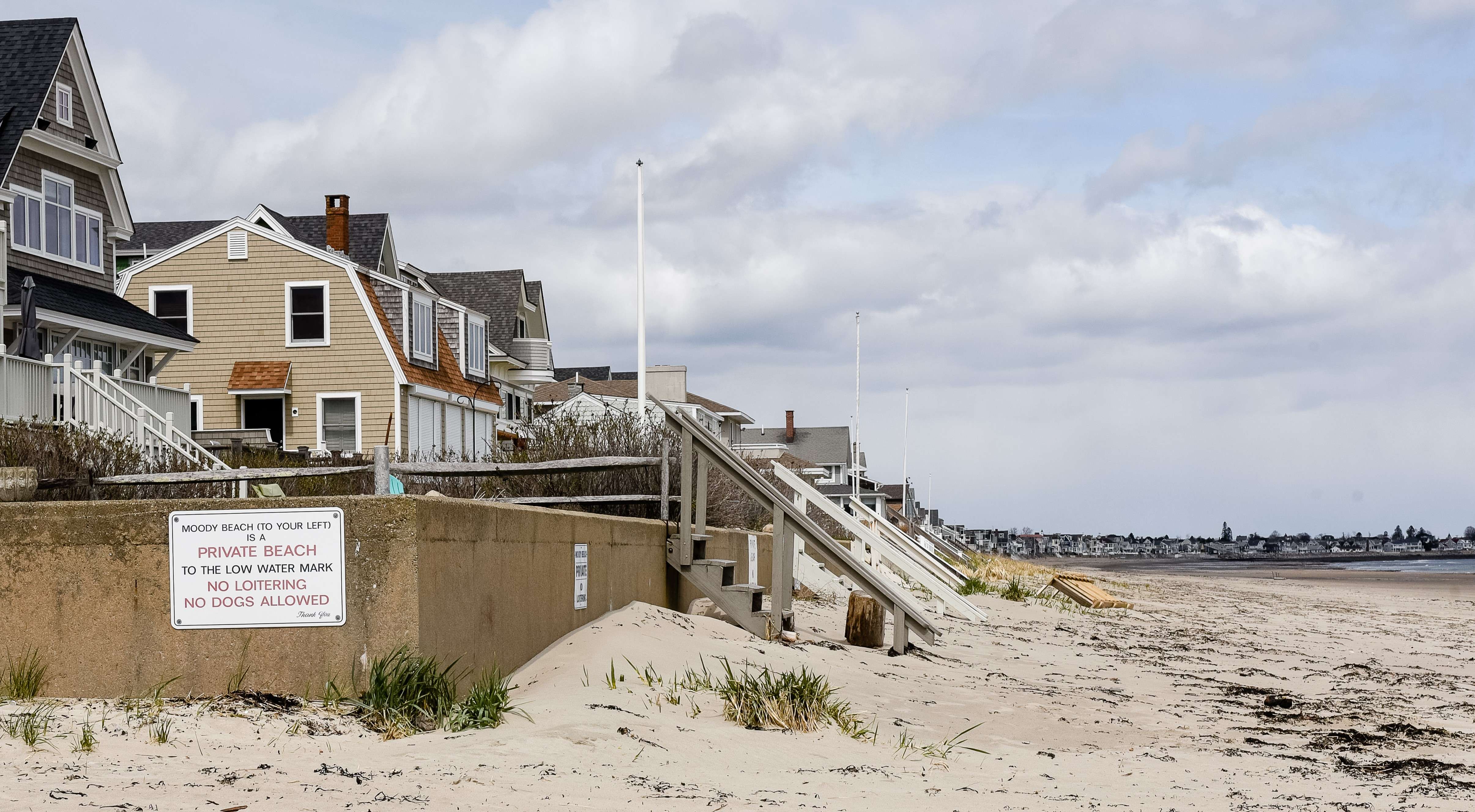
Lawsuit renews decades-old battle over Maine public beach rights
 Courtesy / Maureen Grandmaison Photography
Attorney Ben Ford speaks at a news conference on Moody Beach in Wells after his firm filed a suit on behalf of 23 plaintiffs calling for increased public beach access.
Courtesy / Maureen Grandmaison Photography
Attorney Ben Ford speaks at a news conference on Moody Beach in Wells after his firm filed a suit on behalf of 23 plaintiffs calling for increased public beach access.
A decades' old battle over who has access to the state's beaches heated up again Thursday when a group of 23 southern Maine residents announced they have filed a lawsuit that seeks to reclaim private beaches for the public.
The suit was filed in Cumberland County Superior Court, and seeks to undo a 1989 Maine Supreme Judicial Court ruling that gave private beach owners property rights extending to the low-tide mark. The high tide mark is the standard in most coastal states.
The suit names 10 defendants and asks that the Bell vs. Town of Wells decision of 1989 be overturned. "An historical mistake happened on this spot 30 years ago," attorney Benjamin Ford said at a news conference held at Moody Beach in Wells. "And today we filed a lawsuit to correct that mistake."
Picking up a handful of sand, he said, "The sand we're all standing on is public sand, if we walk 50 feet in that direction," he said, pointing to the houses that line the beach, "we'd all be trespassing." A sign on a cement seawall next to the houses notes that Moody Beach is private to the low-tide mark. "No loitering," it says.
The attorneys who filed the suit said that overturning the 1989 decision not only will allow Maine to rejoin "the vast majority of U.S. states that allow use of the coast by all people," but also boost Maine’s tourism and marine-based economies " and benefit residents and visitors alike by providing clarity to what many have called an ambiguous and frustrating law."
The 10 individuals, businesses and trusts named as defendants "have all taken active positions in blocking people's access to the intertidal," Ford said. The suit charges the defendants have been complicit in, or have actively, “threatened, harassed and chased (the plaintiffs) off land that belongs to them.”
The suit argues that intertidal land is public land, held by the state of Maine in trust for all its people. While the Bell decision concerned the beaches in Wells, it applies to all Maine beaches, and found that beachfront property owners who could produce a deed saying they owned the property "all the way to the ocean," own that stretch of beach.
The decision overturned centuries of precedent, the plaintiffs charge, "inexplicably vesting ownership of Maine’s coastal intertidal zone to upland landowners."
The suit also said that the Bell ruling harms people who rely on the intertidal area to make a living, including clammers, seaweed harvesters and other marine waterfront workers.
"Now, even lobstermen, fisherman and oyster farmers, people who are lawfully working on intertidal land, are being harassed by upland owners who wrongfully believe they own the rocks and mud flats in front of their houses," said a news release that followed the news conference.
Bath resident Bonnie Tobey, one of the plaintiffs and a seaweed harvester, said at the news conference that treatment of people using the beach "has been scary for anyone trying to make a living from harvesting seaweed and other things."
Ford said that since the Bell decision, public beach rights have been drastically reduced on Maine’s extensive coastline.
Attorney Sidney Thaxter, who has represented beach property owners in several lawsuits, told the Portland Press Herald that he doesn't expect to the ruling to be overturned. “They can’t change property owner rights of people without compensating them,” he said.

1989 decision is at core of dispute
The Bell vs. Town of Wells decision in 1989, filed by beachfront property owners, asked the court to prohibit the public from using the beach for recreation from the low tide to the high-tide mark. It was a culmination of decades of back-and-forth between beach property owners and others who wanted to use the beach for recreation, seaweeding and clamming.
The court ruled, 4-3, that only public fishing, fowling and navigation in the intertidal zone, citing the 1641-47 ordinances that allow public access to all of the state's water bodies for those purposes and have set precedent on land rights in the state ever since. The 1989 ruling had its roots in a suit first filed by Wells beachfront property owners in 1984 that cited concern about public use of the beaches.
Ford said Thursday, "As former Chief Justice Saufley has noted, those decisions 30 years ago contained ‘faulty legal analysis.' We will delineate that faulty analysis as the case proceeds, and in the end, we’re confident Maine law will once again clearly state that the people of Maine own all the beaches along the coast, and all the intertidal lands."
Ford said the plaintiffs hope the case will be resolved in a way that provides all people the right to use Maine’s shoreline for exploration and personal enjoyment. He predicted it will be supported by individuals and businesses seeking more freedom to use coastal land, including backlot owners, seaweed harvesters, aquaculture businesses, researchers, surfers, beach-goers "and anyone who wants to experience the beauty and serenity of Maine’s unique coastal lands."
Several businesses in York and Cumberland counties have donated professional services to help launch the website OurBeaches.me, which also went public Thursday.
The site is designed to help Maine residents follow the progress of the lawsuit and facilitate donations to help fund the legal case, said Mark Robinson, president of Robinson PR & Outreach, in Biddeford, who is providing his service free of charge.
“Getting professional services donated to support this effort was a breeze,” Robinson said. "I can feel it in my bones. This lawsuit will enjoy huge public support.”









0 Comments